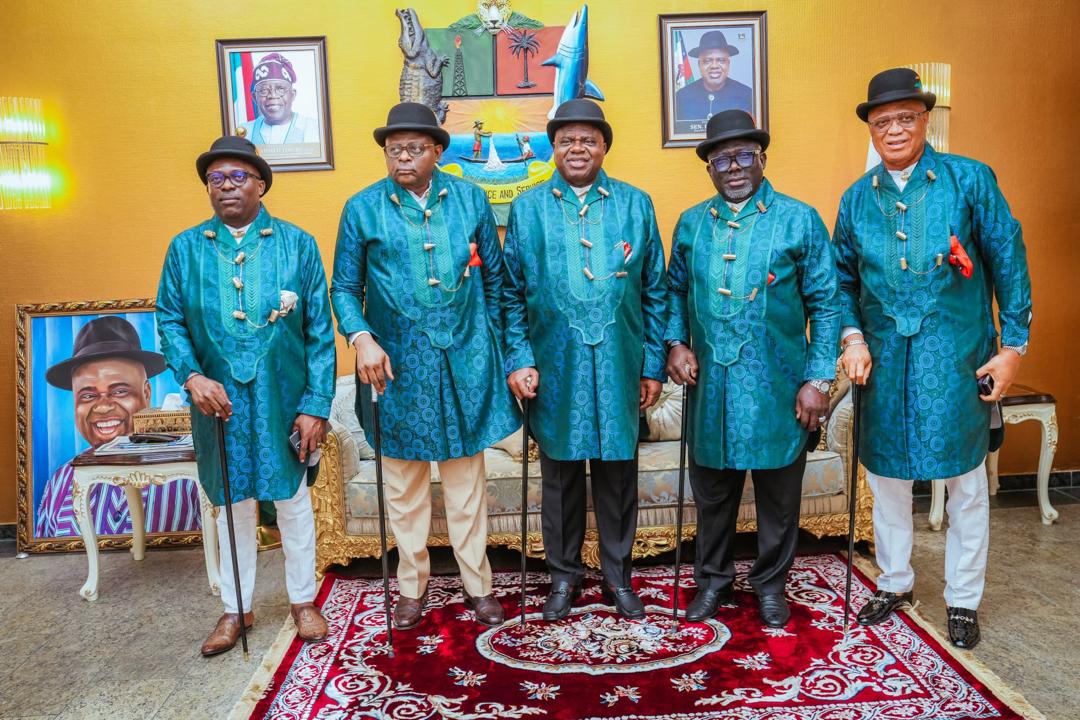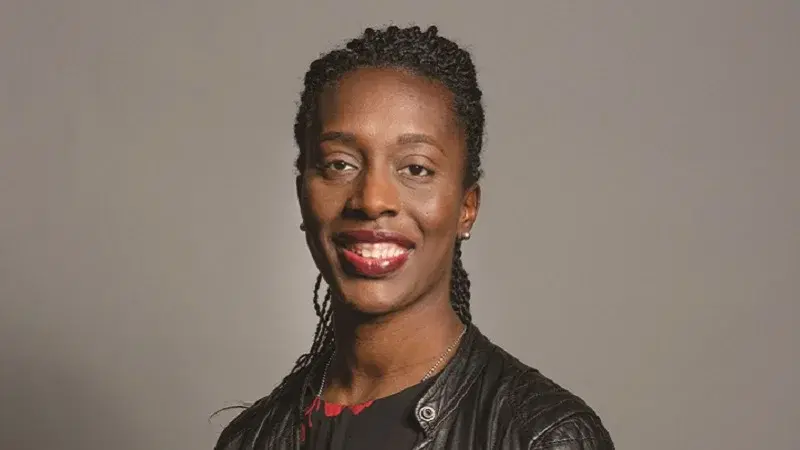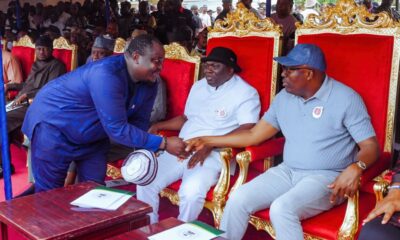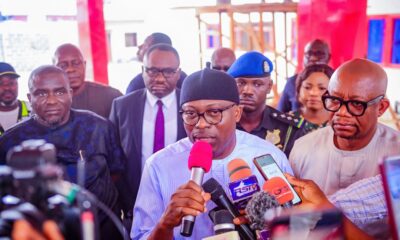News
Rivers, Safest State In Nigeria
The recent comments by the Minister of Transportation, Chibuike Rotimi Amaechi, concerning the safety and security of Rivers State, did not come to many people as a surprise.
His penchant for bitterness propelled propaganda and anger-fuelled political rhetoric are already well known to Rivers people and discerning Rivers watchers.
What is sadly surprising, however, is the occasion he used as platform to ventilate his hate filled sardonic comments, which has left many aghast by the brazen display of this rigid, unbending, cold hearted vindictiveness.
One had expected that a man like Amaechi, who has enjoyed unmerited favour in abundance and unquantifiable goodwill in excess, irrespective of his own very limited credentials, would at least have displayed a modicum of respect in the presence of the mortal remains of a distinguished elder statesman, whom he even referred to as his mentor.
But rather than show humility and reverence, Rotimi Amaechi chose the very sombre and solemn occasion of the funeral service of late Justice Adolphus Karibi-Whyte, to launch into an egocentric rant celebrating his regime as Governor, with disrespectful and megalomaniac impunity to the chagrin and consternation of all who had gathered to bid the great man goodbye.
The Transportation Minister, in his lamentations on what he, in his warped imagination, contrived as the rising spate of insecurity and political intimidation in Rivers State, told the gathering that: “You have lost your voice. The sage has gone under and nobody is speaking. When I was Governor, I gave people voices, but they have blocked those voices. I was happy with the sermon, the Bishop indicted us. If you are a Governor, have you governed well? If you are a politician, have you carried your people along?
“Everyone is scared. We are going back to when Ateke held sway. We are going back to the period where we run away from our people. We are back to a period when nobody can speak. But from next year, I will begin to speak, if nobody wants to speak.”
Rotimi Amaechi also made other atrocious and provocative comments, like casting aspersion on the administration of President Goodluck Jonathan, for the non completion of the Trans-Kalabari Road, as well as some elementary advise he received from the late renowned jurist, which even a greenhorn aspiring politician should be knowledgeable about and all these of course have elevated Justice Karibi-Whyte to the enviable status of ‘his mentor’.
It is quite unfortunate that Amaechi had to spew this verbiage at such a poignant occasion, but those who know him well, have come to understand his uncensored demagoguery, unquenchable lust for divisiveness and the sadistic pleasure he derives in the politics of blackmail and subterfuge.
However, the question to ask Rotimi Amaechi is: what exactly does he want people to say that has not already been said by his diehard attack dogs, hirelings and refuseniks, who have not given the Governor Wike administration breathing space with their worthless, totally irrelevant negative criticisms since 2015? Indeed, which voice is he accusing the great Kalabari people of losing now that the sage is gone?
Obviously, Amaechi has forgotten so soon, how he deceived, insulted and rubbished the whole Kalabari ethnic nation, by first imposing with impunity, a candidate and his crony, who is a complete outsider, in the guise of riverine Governor agitation, at the expense of tried, tested, articulate and seasoned Kalabari sons who contributed huge human and material resources to build the structure he hijacked to achieve his selfish objectives.
Recall also that when that ill fated project failed woefully, he deceitfully dredged up a complete political greenhorn and drafted him as the favoured candidate, all in the name of appeasing Kalabari people. One is compelled to ask, is that the best Amaechi can do for Kalabari people?
Or does he want the people to recall how he sent soldiers to Abonnema, the very home town of the eminent Justice Karibi Whyte that he claims to be his mentor, to slaughter innocent men, women, youths in his quest to seize power at all cost? What did the people do to him as he came to dance on the graves of those that were killed? Nothing. Yet, those who sat down in that church and listened to him excoriate Kalabari people for not speaking out, clapped for him, all in the name of mourning the departed sage. So, what does he want them to say to him now?
The wickedness of Rotimi Amaechi’s anarchist mindset was further revealed when, in very choice sentences, he dragged King Ateke Michael Tom, the Amanyanabo of Okochiri kingdom, into his bitter commentary.
Of course, those who know better understand why he had to drag King Ateke into a hate speech in Kalabari kingdom, but what Amaechi forgot was that the people of Okochiri, with one loud, united voice, came together and unanimously crowned Ateke Tom as their beloved king.
Infact, there has been complete and permanent peace in his kingdom since he was crowned king, except for one incident of external provocation, when soldiers, acting on the command of the Transportation Minister, invaded King Ateke’s palace in the run up to the 2019 elections.
The calculation was to provoke reprisal attacks but wisdom reigned supreme and that evil was defeated and averted. So, will Amaechi’s attempt to foment another trouble again by dragging King Ateke Tom into his bitterness succeed?
The answer is a resounding No, because his dubious intention of invoking the name of King Ateke Tom in Kalabari land is not lost on anybody and the people are not at all fooled for one minute by this latest foul mouthed loquaciousness.
Rivers people, including the Kalabaris, are wiser now and have long passed that stage and nobody, especially Rotimi Amaechi, will drag them back there again for his selfish ambition.
Again, Rotimi Amaechi went to Kalabari land and told the people that President Goodluck Jonathan, who he shamelessly claimed to have reconciled with, refused to give him approval to construct the Emohua/Abonnema Road but he dualised the Airport/Elele/Omerelu which is a federal road project and the people are not talking.
Or maybe, what they should be talking is how come Rotimi Amaechi is getting billions of naira and dollars from China to do railway projects all over the country and even to Niger Republic, except in Rivers State, yet he cannot do anything for Kalabari people, if only to honour his “mentor”, Justice Karibi Whyte?
Talking about security, one must make the incontrovertible point that in Nigeria today, unlike Amaechi’s own imagination, Rivers State is arguably the safest State in the country at this present time and the reason is quite simple.
Governor Nyesom Wike embraced the security challenge frontally and deployed a proactive, effective, functional and pragmatic security strategy, accommodating all security agencies in a symbiotic synergy that completely rejigged the security architecture in the State.
At the commencement of his second term, Governor Wike initiated a comprehensive security platform to address the security challenges facing different parts of the State. This was a product of careful planning and implementation and on Friday, 26th July, 2019, right in the presence of all key stakeholders at the Sharks Stadium in Port Harcourt, he launched a new Rivers State Security outfit code-named Operation Sting.
Operation Sting is an outfit that involves all the security agencies, working in unison to address security concerns in all parts of the state. It is fully funded by the Rivers State Government with the aim of tackling criminal elements, the sources and drivers of insecurity in their diverse criminal manifestations and operations and to nip them in their buds, rout and root them out of existence and reduce crime and criminality in all parts of the state.
To ensure that the new security outfit responded effectively across the state, the administration provided the right logistics and equipment in patrol/operational vehicles fitted with communication gadgets; armoured fitted gunboats, to tighten coastal security and protect the waterways from the activities of criminals; Armoured Personnel Carriers for Police swift responses actions as well as; hand-held mobile radios to enhance communication among the security operatives and overcome the current wide gaps in intelligence gathering.
Operation Sting has functional and operational bases established in all the 23 Local Government Areas to strengthen the command and control structures of the initiative and ensure effective coordination and synergy between the State Headquarters, the Local Government Areas and the communities to achieve the common objective of providing comprehensive security cover for the State.
In addition, the operationalization of Operation Sting across the State has also increased citizens’ awareness and made the public to be more alive to the dangers of insecurity and their responsibility to be part of the present crusade to stamp this menace from the state and in appreciation of the officers and men who will participate in the new security architecture, the State Government set up a fund to cater for their families, in the event of any mishap in the course of service.
The result of this has manifested in the excellent collective intelligence gathering that has led recently to the smoking out and capture of some of the most dreaded criminal elements terrorizing the state over the years. Some were even apprehended outside Rivers State for the simple reason that the Wike administration has made the state too hot for criminals to operate or even hide out. This has made Rivers State arguably the safest state in the country today.
The Next Supermarket, the biggest in West Africa, Turkish Airline, Ethiopian Airline, Greenville Energy Company and Stockgap Nigeria Limited are new businesses thriving under this administration. In fact, the Nigerian Liquefied Natural Gas (NLNG) Train 7 Project could not have taken off if there is insecurity.
To buttress this point Governor Wike, in a recent Television interview said: “Rivers State is safer than any other State. See what is happening in Borno, Kaduna and Plateau States where bandits have taken over their areas. When Amaechi was Governor, Julius Berger Nigeria PLC was chased away because of insecurity. But they are here now, constructing roads all over the State without fear.
“The heads of security agencies that Amaechi influences their postings, come here and see the reality on ground.”
So, the Transportation Minister, having nothing better to say, than to instigate people with his provocative comments, has confessed that he will start talking from next year, if nobody wants to talk from now till then. But sadly for him, Rivers people are now wiser and nobody is afraid of talking because many people have come to the realization that when they talk, the Governor listens and makes sure he delivers what the people want.
Governor Wike is not only delivering good governance, he is also fulfilling all the promises he made to Rivers people. And that is why, when he also talks, the people listen and comply, as they demonstrated commendably during the Covid-19 lockdowns.
This, of course, is a far cry from what obtained in the previous administration where, when the Judges talked the courts were shut down for two years, when lecturers spoke, they were suspended. In fact, anybody who raised a voice of dissent was either clamped down by the dictator or denied the dividends of democracy.
The fact remains that Amaechi is the singular most divisive political figure in Rivers State today and the feeling, even amongst his own supporters, is that he is only deceiving himself, if he believes he will continue to behave like a dictator and an unpopular godfather, whose word must be obeyed always, in the political space of Rivers State.
Rivers people have proved to him that they are not afraid to talk and they have spoken loudly and clearly every time it mattered most, especially in 2015 and 2019. Rivers people are talking and Governor Wike is a listening Governor, who hears what they are saying and is responding to their voices with the commitment and dedication of a leader who has the interest of his people at heart.
Nsirim is the Commissioner for Information and Communications, Rivers State.
News
Let’s Approach Regional Development Issues Differently – Fubara …As S’South Govs Host Fubara To 50th Birthday Celebration

Rivers State Governor, Sir Siminalayi Fubara, has sued for a change in the current approach adopted by South South Governors in their pursuit to achieve holistic regional development and economic prosperity.
The governor insisted on de-emphasis in vested individuals’ political interests while looking at the bigger picture of achieving enduring regional integration that will strengthen unity of purpose to change the trajectory of development in the region.
Fubara made the appeal during the meeting of Governors of South-South States, under the auspices of BRACED Commission, at the Bayelsa State Government House in Yanagoa on Tuesday.
This was contained in a statement by the Chief Press Secretary to the Governor, Nelson Chukwudi.
BRACED is an acronym for Bayelsa, Rivers, Akwa Ibom, Cross River, Edo and Delta.
He said: “I want to appeal that if we have to succeed in this drive, we need to keep our political differences aside and understand that the struggle, as at today, is for posterity, for the development of our region.
“It is really sad that in Niger Delta that is the economic base of this country, the construction of a road that you tagged ‘East-West Road’ could be an issue, that we need to beg, protest, and complain to get it fixed. I don’t think it is proper.”
Governor Fubara stated that it is not that the federal authorities do not understand that Niger Delta needs the road but quickly added that they have seen that even the people of the region do not take themselves seriously.
The governor said the moment Niger Delta people stopped playing to the gallery, and place value on themselves, outsiders will have no option than to accord the region and its people due regard.
Fubara said: “On my part, I want to say this: This is not the first time we are meeting. For me, I followed the course of the region meeting in a forum that we tagged “BRACED Commission.”
“BRACED Commission is also one of the bodies that was constituted at that time to support and work out development strategies for this region. But what I am seeing today is just limiting this meeting to only BRACED COMMISSION.
“We need to widen the scope where other leaders of the region should be part of the discussion of the development of the region, and I think this is the direction that will help the region.”
Reading the Communique of the meeting, the new Chairman of the Forum of Governors of South-South States, and Governor of Bayelsa State, Senator Douye Diri, said they support the Federal Government Tax Reform Bills, and urged President Bola Tinubu to extend the Value Added Tax (VAT) sharing percentages to oil and gas derivation.
He stated the Forum’s request to the Federal Government to urge relevant stakeholders and agencies to extend remediation of polluted environment ongoing in Ogoni land to other impacted communities and States in the region.
Governor Diri also said that the Forum resolved to establish a structural regional security network to enhance safety and security, foster stable Niger Delta region conducive for economic growth and prosperity.
Highlight of the event was the hosting of Governor Fubara to a surprise 50th Birthday celebration by the Governors of South-South States at the Government House in Yenagoa.
News
Fubara Lauds Tinubu For Setting Up Education Load Fund … Vows To Ensure Rivers Benefit Maximally From Scheme

The Rivers State Government has applauded President Ahmed Bola Tinubu for conceiving the idea of setting up the Nigeria Education Loan Fund (NELFUND) which has opened up opportunities for youths to acquire tertiary education irrespective of their financial status.
Rivers State Governor, Sir Siminalayi Fubara, gave the commendation while playing host to a delegation from NELFUND who came on an advocacy visit to the Government House in Port Harcourt on Tuesday.
Represented by his deputy, Prof. Ngozi Nma Odu, Governor Fubara said in developed countries it is common for people to go through school with loans which they sometimes pay all throughout their lives, noting that “for us, it is more accessible and more friendly because you would be required to pay back the loan two years after your National Youth Service.
“It is a win-win situation; it is a situation where the youths in Nigeria should not say because my parents are poor or passed away I cannot improve on my educational growth. This offers them a golden opportunity and I am glad you came for this advocacy.”
The governor urged NELFUND to intensify its advocacy to let the people know how they can benefit from it, adding that it is more important when talking about vocational institutions.
“If you look at the developed countries it is people that went to the vocational schools that make so much money, because it is pricey to get somebody to do anything, we need to instil this into our people, our youths, because people sometimes tend to look down on people that went to vocational schools, it should not be,” he said.
Fubara expressed delight with the NELFUND programme and assured that the State Government would do whatever it can to ensure Rivers State benefits maximally from the scheme.
In his remarks, the Managing Director and Chief Executive of NELFUND, Dr. Akintunde Sawyer, informed the governor that they were in Rivers State to seek the support of the State Government towards the loan, stressing that President Tinubu has directed them to ensure no Nigerian student who has the ability and desire to get educated at tertiary level is denied the opportunity due to lack of funding.
He explained that the scheme provides interest-free loans to students who apply, adding that these loans are not repayable until two years after their Youth Service when they must have gotten a job.
News
UK Appoints British-Nigerian As Trade Envoy To Nigeria

A British-Nigerian politician, Florence Eshalomi, has been appointed as the United Kingdom’s trade envoy to Nigeria.
Her appointment makes Eshalomi the second Nigerian to hold the position.
Confirming her appointment on X on Tuesday, she wrote: “It is an honour to have been appointed as the United Kingdom’s Trade Envoy to Nigeria.
“I’m looking forward to building on my close ties with Nigeria to promote a strong and flourishing economic relationship between our two great nations.
“I am looking forward to strengthening the UK’s relationship with Nigeria to explore shared growth and opportunities for both countries.”
Announcing the appointment in a statement on Tuesday, Jonathan Reynolds, the UK’s Business and Trade Secretary, said the decision was aimed at attracting investment into the UK and boosting economic growth.
“I’ve launched a new team of trade envoys who will use their experience, expertise, and knowledge to unlock new markets around the world for British businesses, attract investment into the UK, and ultimately drive economic growth,” Reynolds said.
Eshalomi, 44, is an MP representing the Vauxhall and Camberwell Green constituency.
She holds a Bachelor of Arts (Hons) in Political and International Studies with Law from Middlesex University.
-

 News2 days ago
News2 days agoFRSC Records 9,570 Road Crashes, Arrests 21,580 Offenders In 2024
-

 Rivers3 hours ago
Rivers3 hours agoNot Too Young To Lead Founder Extols Fubara’s Virtues
-
Niger Delta2 days ago
Ag. Paramount Ruler Restates Stance On Recognition … As Factional Tussle Intensifies In Bayelsa Community
-

 News1 hour ago
News1 hour agoFubara Lauds Tinubu For Setting Up Education Load Fund … Vows To Ensure Rivers Benefit Maximally From Scheme
-

 Niger Delta2 days ago
Niger Delta2 days agoNEITI Eyes Energy Sufficiency Through PH, Warri Refineries
-
Business2 days ago
Diri Pushes For Africa’s Sub-nationals’ Partnership On Economy … As Bayelsa, Angolan Province Synergizes On Fisheries, Agric
-
Politics2 hours ago
Presidency, APC React As El-Rufai Criticises Party, Urges United Opposition
-
Niger Delta2 days ago
Edo Governorship Election: Tribunal Relocates To Abuja

